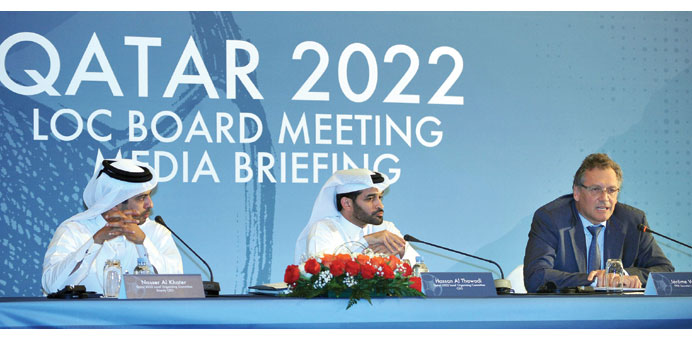Supreme Committee for Delivery and Legacy secretary general and Local Organising Committee CEO Hassan al-Thawadi, centre, FIFA secretary general Jerome Valcke and Local Organising Committee deputy CEO Nasser al-Khater, who is also the executive director, communications and marketing at the Supreme Committee for Delivery and Legacy, at yesterday’s press conference in Doha.
FIFA secretary general Jerome Valcke rules out any prospect of Europe’s football clubs receiving financial compensation for the 2022 World Cup being moved to November-December
By Anil John
Sports Editor
European clubs impacted by FIFA’s decision to hold the 2022 World Cup in the winter will not get any money as compensation – or for that matter even an apology, secretary general Jerome Valcke has said.
Former German footballer Karl-Heinz Rummenigge, who now heads the European Clubs’ Association (ECA), and other top officials had hinted that top European clubs would seek financial compensation for any disruption caused to their leagues because of the tournament’s shift from its traditional summer slot, but a bullish Valcke red-carded that suggestion, saying there’s still plenty of time for them to get adjusted to the idea.
“There will be no compensation. I mean, they have seven years to reorganise football around the world for this World Cup,” said Valcke while addressing a press conference at the Ritz-Carlton, a day after a FIFA task force recommended the winter shift during a meeting in Doha.
“It’s not perfect, we know that - but why are we talking about compensation? It’s happening only once, we’re not destroying football. We are just changing the format of a season,” he added.
Valcke was also asked whether FIFA would offer an apology to the clubs for upsetting their schedules, but the Frenchman dismissed it outright, saying there was no need for one as the clubs benefit from World Cup revenues anyway.
“I don’t think it’s a time for apologies. Why should we apologise to the clubs? We have had an agreement with the clubs that they are part of the beneficiaries. It was $40mn in 2010 and $70mn in 2014.
The proposed new dates for the event are set to be ratified by FIFA’s executive committee on March 19.
Valcke said the compact world Cup in Qatar would be of immense benefit to the players and the spectators and would have a positive legacy to benefit the community.
“It’s the first time the World Cup will be held in the region. It’s going to be a special and compact World Cup. Teams will be based at one place and there would be no stress of frequent travelling and moving from place to place.”
He added that because the FIFA wants the tournament to be held over a 28-day period rather than the usual 32 days, more matches would be played per day, which means Qatar will require fewer stadiums.
“We are talking about a reduction of the competition in terms of the number of competition days. We are talking about 28 days and not 32 days. “Normally we are looking at 10 stadiums but it could be eight.”
Supreme Committee secretary general and Local Organising Committee CEO Hassan al-Thawadi said that regardless of the tournament’s switch to winter, Qatar would continue investing in developing cooling technologies that would benefit the country in many ways.
“We have always said that the cooling technology will be the legacy of the World Cup and beyond. The development of the cooling technology will continue, our research will continue because it will help the country.
“We can use it to develop greenhouses… to improve our food security.”
Al-Thawadi added that the drop in oil prices won’t affect Qatar’s preparations much because the country’s goal is “economic diversification” and all projects would be“economically feasible”.
He dismissed suggestions that Qatar wanted to send out any political message through the World Cup.
“This is the first time the World Cup is coming to the Middle East, but we are talking about politics. Qatar and this region are passionate about sports, especially football. Bringing the World Cup here is a significant step.
“It would open up doors…open up minds. Look at the positives, there’s going to be a tangible legacy. There is no other force that brings people together more than football. This is a great opportunity for us.”
FIFA “very happy” with steps taken by Qatar
FIFA secretary general Jerome Valcke said yesterday that there were still problems with the conditions of migrant workers building stadiums for the 2022 World Cup but he was “very happy” with steps taken by Qatar.
“It’s clear there are problems and things to be solved,” Valcke told a Doha press conference.
He said that Qatar was beginning to comply with international standards, which was a “big step”. He also said FIFA was in continuing discussions with groups such as the International Labour Organisation over the issue of workers’ rights.
Valcke added that he had visited “a lot of stadiums” on Tuesday, after a FIFA task force meeting decided to recommend moving the tournament to November and December 2022 because of climate concerns.
“In a nutshell I am very happy with what we have seen,” he said.
Valcke said he had inspected conditions for workers on site and their accommodation facilities and said the changes taking place were down to the “power of the World Cup”.
Workers’ rights in Qatar have long been a controversial issue since the state was awarded the tournament in December 2010.
Rights groups say any reforms brought in by the country have been too slow.
Earlier this month, Qatar announced it was introducing a system to ensure migrant workers would be paid at least once a month, a move long called for by groups such as Amnesty and Human Rights Watch.

